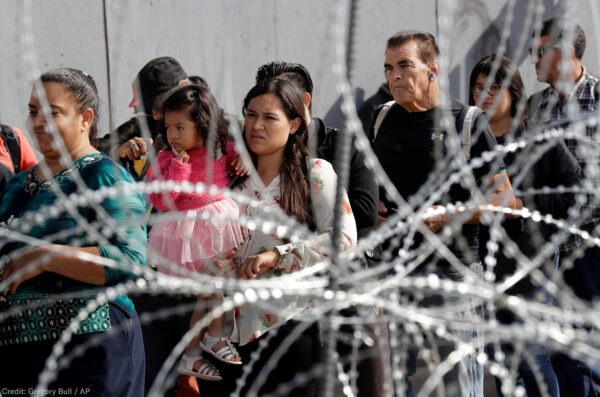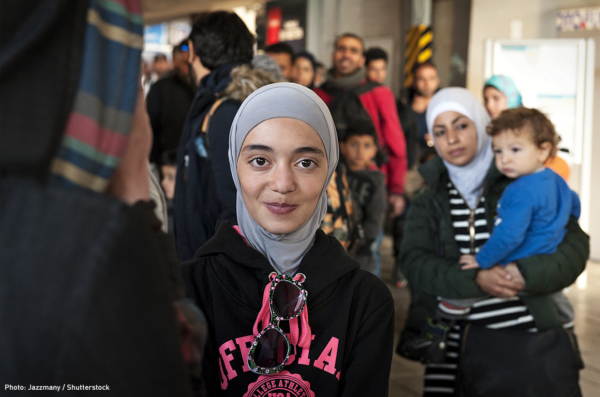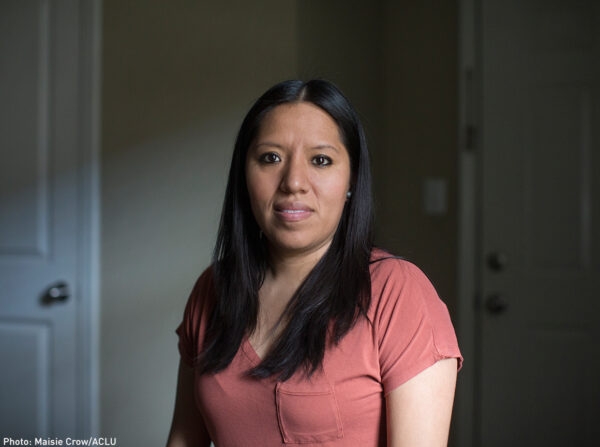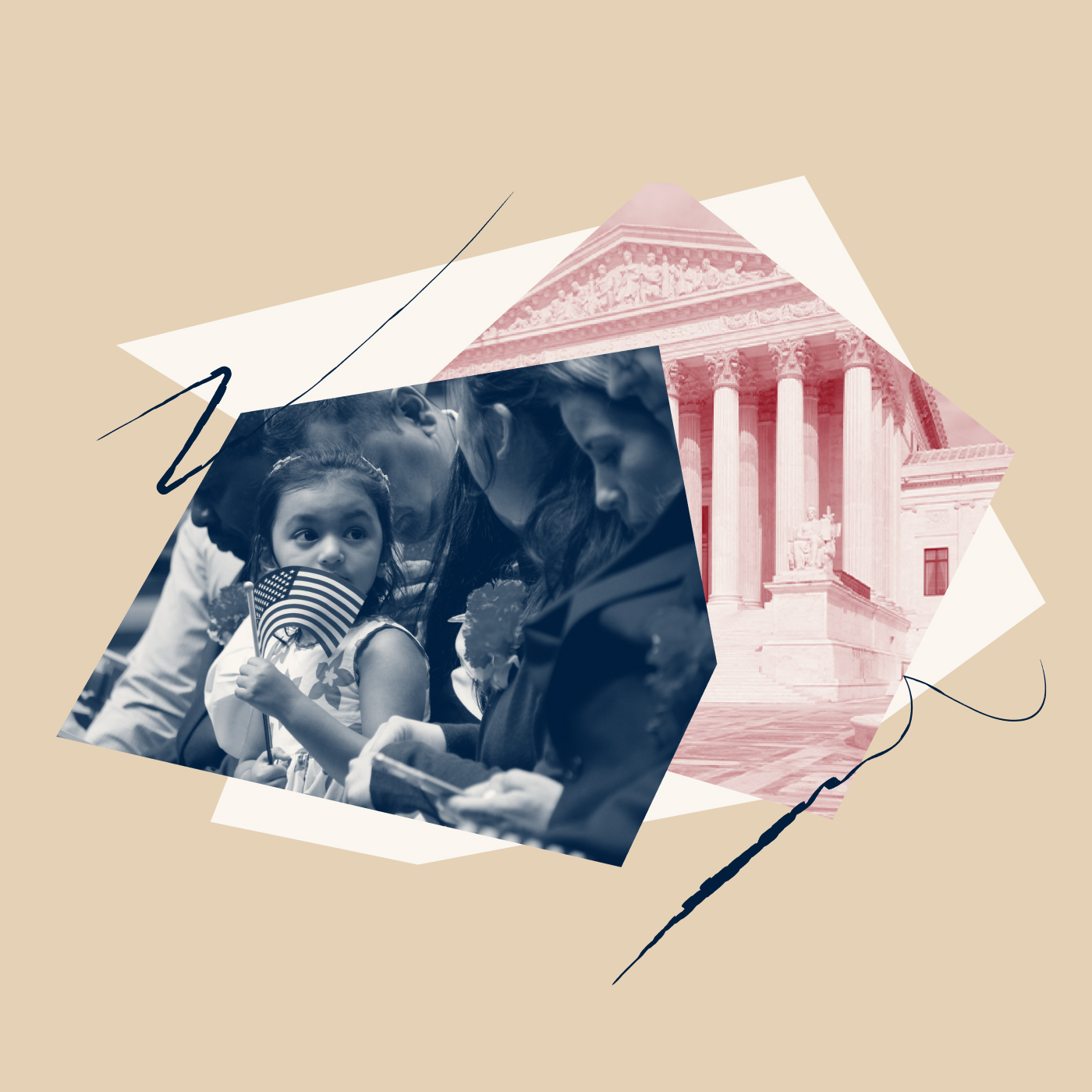Immigrants' Rights
Barbara v. Donald J. Trump
President Trump is attempting to undermine the promise of birthright citizenship to children born on U.S. soil. But the ļž–” ”∆Ķ and partners are fighting to protect the rights of citizens that are plainly stated in the Constitution, federal statute, and reaffirmed by the Supreme Court for more than a century. We‚Äôre arguing against the Trump administration in the Supreme Court and are confident we will win.
Status: Ongoing
View Case
Learn ļž–” ”∆Ķ Immigrants' Rights
Featured
U.S. Supreme Court
Jan 2022

Immigrants' Rights
Garland v. Gonzalez
Whether the Immigration and Nationality Act requires a bond hearing for immigrants subject to prolonged detention while seeking protection in the U.S. from persecution or torture.
U.S. Supreme Court
Aug 2021

Immigrants' Rights
Innovation Law Lab v. Wolf
The ļž–” ”∆Ķ, Southern Poverty Law Center, and Center for Gender & Refugee Studies filed a federal lawsuit challenging the Trump administration‚Äôs new policy forcing asylum seekers to return to Mexico and remain there while their cases are considered.
U.S. Supreme Court
Jul 2021

Immigrants' Rights
National Security
Sierra Club v. Trump ‚ÄĒ Challenge to Trump‚Äôs National Emergency Declaration to Construct a Border Wall
In February 2019, the ļž–” ”∆Ķ filed a lawsuit challenging President Trump‚Äôs emergency powers declaration to secure funds to build a wall along the southern border. The lawsuit was filed on behalf of the Sierra Club and the Southern Border Communities Coalition. The lawsuit argues that the president is usurping Congress‚Äôs appropriations power and threatening the clearly defined separation of powers inscribed in the Constitution. On January 20, 2021, President Biden halted further border wall construction. Litigation in this and subsequent related challenges has been paused or deadlines extended while the ļž–” ”∆Ķ‚Äôs clients and the Biden administration determine next steps.
U.S. Supreme Court
Jun 2020

Immigrants' Rights
Department of Homeland Security v. Vijayakumar Thuraissigiam
Whether immigrants are entitled to seek judicial review of their ‚Äúexpedited removal‚ÄĚ orders in federal court.
U.S. Supreme Court
Jan 2020

Immigrants' Rights
International Refugee Assistance Project v. Trump
The ļž–” ”∆Ķ and other partner organizations filed a federal lawsuit challenging President Trump‚Äôs Muslim ban executive order, charging it violates the Constitution ‚ÄĒ including the First Amendment‚Äôs prohibition of government establishment of religion and the Fifth Amendment‚Äôs guarantees of equal treatment under the law ‚ÄĒ and federal laws.
U.S. Supreme Court
Mar 2019

Immigrants' Rights
Nielsen v. Preap
Whether the government can require that certain people are detained for the duration of their deportation proceedings ‚ÄĒ without a hearing ‚ÄĒ because they have past criminal records.
Court Case
May 2018

Immigrants' Rights
Colotl v. Kelly
UPDATE 5/25/18: The Department of Homeland Security has agreed to renew Jessica Colotl‚Äôs Deferred Action for Childhood Arrivals (DACA) and work permit to resolve a lawsuit brought by the ļž–” ”∆Ķ, the ļž–” ”∆Ķ of Georgia, and Kuck Baxter Immigration in May 2017 against DHS for arbitrarily terminating Jessica‚Äôs DACA and rejecting her renewal application.
Indiana
Oct 2016

Immigrants' Rights
National Security
Exodus Refugee Immigration, Inc. v. Mike Pence, et al
The ļž–” ”∆Ķ and the ļž–” ”∆Ķ of Indiana, on behalf of Exodus Refugee Immigration, filed suit against Governor Mike Pence and the secretary of the Indiana Family and Social Services Administration to stop attempts to suspend resettlement of Syrian refugees, claiming the governor‚Äôs actions violate the United States Constitution and federal law.
All Cases
186 Immigrants' Rights Cases

California
Jan 2016
Immigrants' Rights
Prisoners' Rights
Lyon v. ICE, et al
On June 14, 2016, the ļž–” ”∆Ķ, along with the ļž–” ”∆Ķ of Northern California, and the firms Orrick, Herrington & Sutcliffe and Van Der Hout, Brigagliano & Nightingale, have filed a settlement agreement in the class-action suit Lyon v. the U.S. Immigration Customs and Enforcement agency (ICE). The settlement requires the agency to give detainees at four Northern California immigrant detention facilities improved access to telephones, including creating private spaces for free and direct calls, delivering phone messages, removing arbitrarily short limits on call duration, and making accommodations for indigent immigrants.
Explore case
California
Jan 2016

Immigrants' Rights
Prisoners' Rights
Lyon v. ICE, et al
On June 14, 2016, the ļž–” ”∆Ķ, along with the ļž–” ”∆Ķ of Northern California, and the firms Orrick, Herrington & Sutcliffe and Van Der Hout, Brigagliano & Nightingale, have filed a settlement agreement in the class-action suit Lyon v. the U.S. Immigration Customs and Enforcement agency (ICE). The settlement requires the agency to give detainees at four Northern California immigrant detention facilities improved access to telephones, including creating private spaces for free and direct calls, delivering phone messages, removing arbitrarily short limits on call duration, and making accommodations for indigent immigrants.

Massachusetts
Dec 2015
Immigrants' Rights
Gordon v. Johnson and CASTA√ĎEDA v. Souza
In Gordon v. Johnson, the ļž–” ”∆Ķ and its partners obtained a class action ruling making some 150 Massachusetts detainees a year eligible for individual bond hearings. Rather than being held in ‚Äúmandatory‚ÄĚ immigration detention, without a bond hearing, these noncitizens may now obtain their release if an immigration judge concludes that they do not pose a danger or flight risk. Since May 2014, the federal district court‚Äôs ruling has allowed more than 100 noncitizens to be released from mandatory detention and remain with their families while their immigration cases are resolved.
Explore case
Massachusetts
Dec 2015

Immigrants' Rights
Gordon v. Johnson and CASTA√ĎEDA v. Souza
In Gordon v. Johnson, the ļž–” ”∆Ķ and its partners obtained a class action ruling making some 150 Massachusetts detainees a year eligible for individual bond hearings. Rather than being held in ‚Äúmandatory‚ÄĚ immigration detention, without a bond hearing, these noncitizens may now obtain their release if an immigration judge concludes that they do not pose a danger or flight risk. Since May 2014, the federal district court‚Äôs ruling has allowed more than 100 noncitizens to be released from mandatory detention and remain with their families while their immigration cases are resolved.

California
Oct 2015
Immigrants' Rights
Rodriguez, et al. v. Robbins, et al.
On October 29, 2015, a federal appeals court affirmed and expanded its prior ruling that immigrants in prolonged detention receive a bond hearing. In Rodriguez v. Robbins, a class-action lawsuit , the court upheld an order requiring bond hearings for detainees locked up six months or longer while they fight their deportation cases. The ruling stands to benefit thousands of immigration detainees across the Ninth Circuit, where an estimated 25% of immigrant detainees are held every year.
Explore case
California
Oct 2015

Immigrants' Rights
Rodriguez, et al. v. Robbins, et al.
On October 29, 2015, a federal appeals court affirmed and expanded its prior ruling that immigrants in prolonged detention receive a bond hearing. In Rodriguez v. Robbins, a class-action lawsuit , the court upheld an order requiring bond hearings for detainees locked up six months or longer while they fight their deportation cases. The ruling stands to benefit thousands of immigration detainees across the Ninth Circuit, where an estimated 25% of immigrant detainees are held every year.

Court Case
Jul 2015
Immigrants' Rights
RILR v. Johnson
The U.S. District Court for the District of Columbia ordered a preliminary injunction that puts an immediate halt to the government's policy of locking up mothers and children from Central America ‚Äď all of whom have been found to have legitimate asylum claims ‚Äď in order to send a message to other migrants that they should not come to the U.S.
Explore case
Court Case
Jul 2015

Immigrants' Rights
RILR v. Johnson
The U.S. District Court for the District of Columbia ordered a preliminary injunction that puts an immediate halt to the government's policy of locking up mothers and children from Central America ‚Äď all of whom have been found to have legitimate asylum claims ‚Äď in order to send a message to other migrants that they should not come to the U.S.

Court Case
Jul 2015
Immigrants' Rights
Escobar v. Gaines
On the night of October 20, 2010, Angel Escobar and Jorge Sarmiento were in their beds in their small, two-bedroom apartment in the Clairmont complex in Nashville. Several roommates and friends were in other rooms. The doors and windows were all shut and locked. Suddenly there was a loud banging at the door and voices shouting "Police!" and "Policia!" When no one answered, the agents tried to force the door open. Scared, occupants hid. U.S. Immigration and Customs Enforcement (ICE) agents began hitting objects against the bedroom windows, trying to break in. Without a search warrant and without consent, the ICE agents eventually knocked in the front door and shattered a window, shouting racial slurs and storming into the bedrooms, holding guns to some people's heads.
Explore case
Court Case
Jul 2015

Immigrants' Rights
Escobar v. Gaines
On the night of October 20, 2010, Angel Escobar and Jorge Sarmiento were in their beds in their small, two-bedroom apartment in the Clairmont complex in Nashville. Several roommates and friends were in other rooms. The doors and windows were all shut and locked. Suddenly there was a loud banging at the door and voices shouting "Police!" and "Policia!" When no one answered, the agents tried to force the door open. Scared, occupants hid. U.S. Immigration and Customs Enforcement (ICE) agents began hitting objects against the bedroom windows, trying to break in. Without a search warrant and without consent, the ICE agents eventually knocked in the front door and shattered a window, shouting racial slurs and storming into the bedrooms, holding guns to some people's heads.
